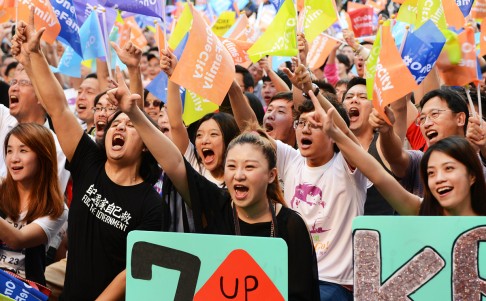
Occupy Central helped Dr Ko Wen-je win Taipei ballot, campaign chief says
Occupy Central indirectly contributed to the election victory of independent Dr Ko Wen-je by inspiring Taipei students to support him, the mayor-elect's campaign chief says.
Occupy Central indirectly contributed to the election victory of independent Dr Ko Wen-je by inspiring Taipei students to support him, the mayor-elect's campaign chief says.
While Saturday's ballots in Taiwan largely reflected public dissatisfaction with the Ma Ying-jeou administration, campaign director Wu Yen-hong said the Hong Kong movement did provide some motivation.
"We encountered some technical problems in the recruitment of volunteers at polling stations," he said.
"Before Occupy Central, more than 1,000 volunteers had signed up to help out outside polling stations. But later the Central Election Commission told us to find 1,583 people within five days to supervise vote-counting inside the stations. At that time we thought it was an impossible task for an independent candidate.
"But coincidentally, Occupy Central started in Hong Kong. We posted recruitment notices on the BBS [bulletin board system] of the National Taiwan University. Within just three days, our volunteer team expanded to 3,000-strong ... We feel there were mutual influences between Taipei and Hong Kong students."

While Ko was helped by pan-green parties that agreed not to field a contender for the seat, Lien was backed by businessmen - many with mainland interests.
Experts said the KMT's humiliating defeat reflected Beijing's failure to sway voter opinions through the influence of business elites, which could prompt a review of policies towards the island and Hong Kong.
"Beijing has been using the same tactic to sway politics with business interests in both Hong Kong and Taiwan," said Lu Ping, a prominent Taiwanese writer and the island's former cultural envoy to Hong Kong.
The Occupy movement might have stimulated anti-Beijing sentiments among Taiwanese voters because they were now more aware of the mainland's hardline approach towards democracy campaigns in Hong Kong, she added.
" Fears that tomorrow's Taiwan will be like today's Hong Kong may have cost the Ma government many votes."
Liu Guoshen , head of Xiamen University's Taiwan Research Institute, said mainland observers might have to take a fresh look at Taiwanese politics, which used to be seen only as a rivalry between a pro-reunification "blue" camp and a pro-independence "green" camp.
"Many more voters now care more about justice and fairness than reunification or independence," Liu said.
"Beijing may enter a new era in handling Taiwan affairs… and to take more care of the interests of [Taiwan's] grassroots."


